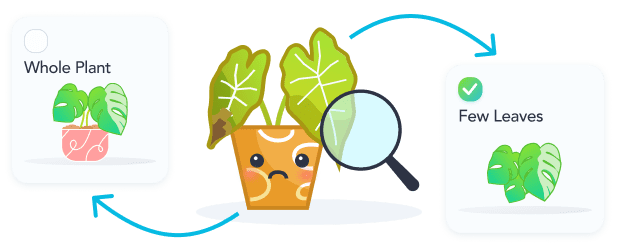Care Guides for Anthurium Bullatus
Every 10d
Recommended Frequency
1 /2 cup of water
Recommended Amount
Caring for anthurium bullatus requires understanding its watering needs. This plant thrives with consistent moisture but dislikes being waterlogged. Water every 3-5 days, adjusting based on the season and your ho...
Every 90d
Recommended Frequency
Caring for your Anthurium Bullatus involves a specific fertilization routine to promote healthy growth and vibrant blooms. It's essential to use a liquid fertilizer that is high in phosphorus, as this supports the develo...
Medium Light
Recommended
Anthurium bullatus thrives in bright indirect light. This means it should be placed about 5 feet away from a southern or western-facing window, or in front of a window with a sheer curtain to filter the sunlight. This se...
Every 730d
Recommended Frequency
As a professional botanist, I'd like to share some essential tips on repotting your Anthurium Bullatus to ensure its health and growth. Repotting is a crucial aspect of plant care that refreshes the soil and provides the...
Caring for anthurium bullatus requires attention to its temperature needs to thrive. This plant prefers a warm environment, ideally between 75 to 85 degrees Fahrenheit. Such a range supports its growth and flowering, mim...
Recommended Soil
For Anthurium bullatus, the recommended soil type is Peat Soil. This choice is due to its excellent moisture retention capabilities, which are crucial for the hydration needs of this particular plant. Peat soil is inhere...
Caring for anthurium bullatus requires attention to its humidity needs, as it thrives in environments that mimic its natural tropical habitat. The ideal humidity range for this plant is between 50% and 80%, with an avera...
Questions about Anthurium Bullatus
#NAME?

Toxicity of Anthurium Bullatus

Common Pests and Diseases
Bacterial Blight
Caused by the bacterium Xanthomonas axonopodis pv. dieffenbachiae, which thrives in high humidity and warm temperatures.
To manage bacterial blight, start by isolating the affected plant to prevent the spread. Remove and destroy all infected parts of the plant using sterilized tools to avoid further contamination. Ensure good air circulation around your plants and avoid overhead watering to keep the foliage dry. Using bactericides can be effective, but their use should be carefully considered and applied according to the product's instructions. Implementing a strict hygiene regimen in your growing area is crucial to prevent future outbreaks.

Related Plants














